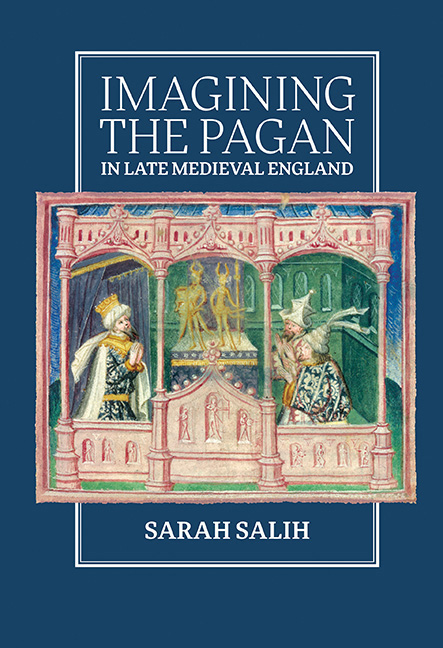3 - The Present: Traces, Recurrences, Survivals
Published online by Cambridge University Press: 15 October 2019
Summary
This chapter will explore the diverse eruptions and traces of the pagan past in the late medieval Christian present. The traces of the pagan were fragmented in the medieval present, sometimes dead and sometimes live, sometimes at home, sometimes abroad. Materials and literature might have worked free of their original contexts, might have been remade in memory, might recur in unexpected places. They were variously reframed, contextualised and curated. Classical literature was mostly unproblematic, but material remnants needed more care to fit them into a Christian world. In Capgrave's guidebook to Rome, the pagan past is still visible in the buildings and artefacts of the converted city, prompting debate as to whether it is wholly dead. Meanwhile, fifteenthcentury debates about the propriety of devotional images return to and reanimate the confrontation of saint and pagan over the idol, as heterodox Christians struggle for the right to name their orthodox neighbours as idolaters; Capgrave's St Katherine registers the impact of the image debate on hagiography in an expanded discussion of images that permits the pagans to articulate their practices of representation. Mandeville's Travels, meanwhile, reworks its source's account of benighted heathens to imagine self-aware pagans whose account of their practices undermines the terms of the image debate, and draws the sting of the stigmatising label of pagan.
Processing pagan fragments
While Christianity retains the Jewish scriptures whilst claiming to supersede them, its rupture with paganity looks more complete. This rupture, however, conceals elements of substantial continuity with antique thought, which leaves some aspects of classical culture still very much alive in the fifteenth century. Jean Seznec argues that ‘the gods lived on in the Middle Ages in concepts which had already taken shape at the end of the pagan epoch’, Camille that it took the literalness of Renaissance mimesis finally to kill them off, Margreta de Grazia that ‘Antiquity could not be reborn until it had first died.’ John M. Fyler sees the medieval relationship to classical antiquity as ‘at once more tentative and more assured than our own.
- Type
- Chapter
- Information
- Imagining the Pagan in Late Medieval England , pp. 115 - 172Publisher: Boydell & BrewerPrint publication year: 2019



